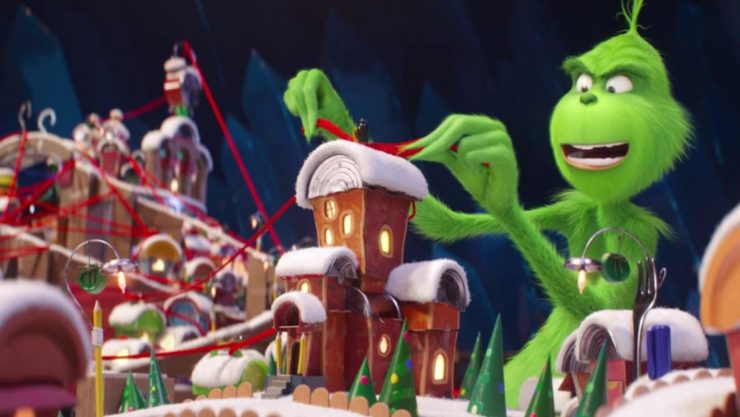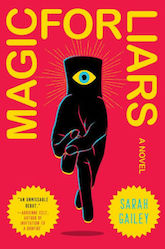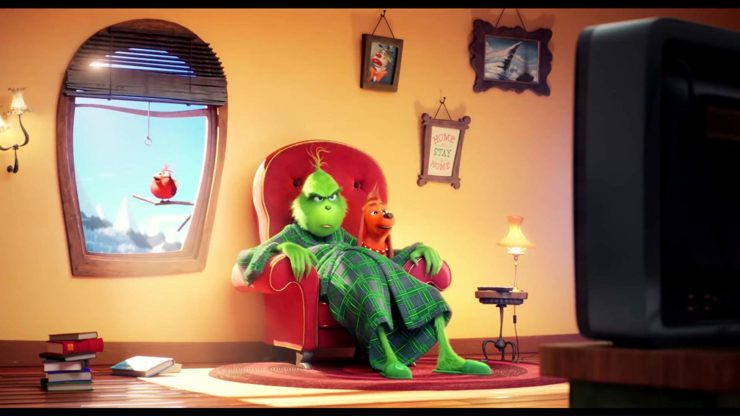It’s a covenant between Hollywood and its audience, these days, that all kids’ movies should also appeal to the adults who’ve been dragged along by their children.
As a parental cinema-goer, I’ve come to expect a mixed bag when I take my daughter to the cinema. I’ve been to see the excellent Strange Magic and the psychedelic but charming Trolls. More recently, I’ve watched the brain-meltingly boring Hotel Transylvania 3: Summer Vacation as well as Incredibles 2. I’d had such high hopes for The Incredibles sequel, but was disappointed by it—the focus on Mr. Incredible as the stay-at-home parent while Elastigirl went out to save the world was refreshing, but the rest of the movie plodded along with only the character of Edna Mode being as engaging second time around.
If I’m honest, I was expecting The Grinch to be similarly disappointing. I figured it would be, at best, predictable; at worst, a cringeworthy rehash of the adaptations that had gone before. But it’s neither of these things. This latest adaptation of Dr. Seuss’s classic story is sweet, funny, and offers up subtle moral lessons about the glaring consumerism of the festive season.
I should say from the start that the film’s wonderful soundtrack earned it major bonus points. The Grinch is a film that many modern-day kids will grow up remembering as part of their childhood in the same way that kids of my generation look back nostalgically at the Tim Burton classics like The Nightmare Before Christmas, Edward Scissorhands, or Batman Returns. So, what a treat it was to sit through another festive film with the strains of Danny Elfman’s score surrounding me. Whether or not is was a deliberate decision by the studio (Illumination) to enlist a composer so well known to their adult audience, or whether it was just happy coincidence, Elman’s music nevertheless lifts this film a little bit further above the mediocre status quo.
For the purists among us who adore Dr. Seuss, stretching his funny but sweet short story into an hour and twenty minutes might seem as much of a travesty as when Peter Jackson stretched The Hobbit into three full movies. But what Illumination gets right—which Jackson arguably overlooked—is character. If you’re telling a story that everyone already knows, with a fixed ending that the audience anticipates, what keeps people from getting bored is the characterization: We all know where the Grinch ends up, what we want to see is how he gets there.

That’s not to say that Illumination haven’t put time, effort, and a substantial budget into making The Grinch look spectacular, because they certainly have. The sheer wealth of Christmas lights in Whoville is overwhelming, the Grinch’s fur is so silky-smooth you feel you could touch it, and the CGI snow is almost perfect in its representation of the real thing. But these visual flourishes are the icing on the cake of this movie, rather than the main attraction…
It is the Grinch himself who is the star of this show: The writers have given him depth and weighted his actions and motives with meaning, the animators have given him style and evocative expressions, and Benedict Cumberbatch has given him a voice that conveys a wide range of emotions.
In his excellent book on screenwriting, Save the Cat!, Blake Snyder points out that you must always give the audience a reason to root for the protagonist. Illumination have taken this advice and run with it—for a start, their Grinch is less zany and more rational that previous incarnations, and that makes him so much more likable. That, in itself, is quite an achievement. Let’s face it: it’s hard to love the Grinch. He’s mean and selfish, just like that other festive grouch, Ebenezer Scrooge. We don’t exactly enjoy watching these characters and their actions, but rather we are thrilled by the theme of their possible redemption. After all, the holidays are a time of goodwill to all; a time for all of us to learn to love the grumpy Grinches and Scrooges of this world…but always with the proviso that they will repent and be redeemed.
There has never been any real attempt to rationalize Scrooge’s awful behavior: he was a bad man who valued money above people, and that was an end to it. In How the Grinch Stole Christmas, a Ron Howard film starring the madcap Jim Carrey, the Grinch was played mainly for laughs, but they did include a backstory explaining how he’d become such a grouch. Adopted as a baby, the young Grinch was bullied at school, and the humiliations that he suffered at the hands of some of the Whos turned him into the unpleasant creature that we know from the original tale.
While this backstory goes some way to explaining the Grinch’s attitude, it doesn’t make him much more likable. His actions are still mean and cruel, and he’s ruled by his temper in an outrageous manner—partly because Carrey tends to go for extremes in his comic acting. In addition, this backstory doesn’t show the Whos in a very good light, either.
Buy the Book


Magic for Liars
In the new film, however, Illumination have taken a different approach and provide an alternative reason for the Grinch being the way he is. His behavior is due to past pain and rejection, something all of us can sympathize with in one way or another. Moreover, the rejection wasn’t personal or down to the bad behavior of any individual in Whoville; the Grinch was just a victim of circumstance.
The way that Cumberbatch’s Grinch expresses his anger is also vastly different from Carrey’s interpretation. For example, one scene in How the Grinch Stole Christmas involves Carrey lecturing the Whos on their shallowness and inviting them to kiss his ass beneath the mistletoe before setting fire to their tree. There is nothing so garish in the latest adaptation. Instead, Cumberbatch’s exceptional vocal talents work in combination with the skills of the animators in creating realistic facial expressions in order to convey his emotional reactions. The Grinch’s distaste is also expressed on a more personal level through understated conversations between the Grinch and other characters, in contrast to the over-the-top style of the previous film.
Another strongly appealing feature of this film is the Grinch’s relationship with his dog, Max. In the previous adaptation with Jim Carrey, and also in the 1966 animated version narrated by Boris Karloff, the Grinch is just as mean to his dog as he is to the Whos. In this latest movie, though, we see the Grinch treating Max with affection. Sure, the dog has to get up and make him coffee every morning, but there are tender moments between the two of them that make you realize that the Grinch genuinely cares about his pet. Even before his final redemption and the swelling of his heart, we’ve already taken the Grinch into our own hearts because he’s an animal lover and that’s something almost everyone can all appreciate. We can extrapolate that a creature who is this kind to his own dog has the capacity to be kind to others, too.
Rather than being shy and afraid of the Grinch, Max is loyal and acts as his partner in crime. His belief in his master never wavers. When you’re sitting in the theatre and caught up in the movie, Max’s attitude matters a great deal since we are instantly willing to believe in the Grinch’s goodness because this kind, loyal character already does. Even though the main thrust of the story still centers on how grumpy and cynical the Grinch is about the jolliest time of the year, these heart-warming moments between master and dog keep the audience on his side.

Intertwined with the Grinch’s distaste for Christmas because of past rejection is his disgust at the crass commerciality of it all. His interaction with Cindy Lou early on when she tells him about her letter to Santa (which he describes as her “list of demands”) highlights an issue that is rather prevalent among families today: the expectation of presents.
Gone are the days when children were satisfied with a bit of chocolate and fruit, some nuts, and a wooden toy in their stockings. These days, children who celebrate can opt for sacks rather than socks to leave out for Santa. Christmas equals presents, and it’s hard to shake loose this idea when marketing and festive events reinforce the connection so strongly. So, while there’s still plenty of comedy slapstick in The Grinch to entertain the kids and the wonderful Danny Elfman music to bring joy to parents, there’s also an important message hidden within the charm and humor and color. Cindy Lou doesn’t want presents from Santa—she wants some help from her mother; and when the Grinch finally achieves his aim, he finds that the Whos still celebrate Christmas anyway. Both of these plot points drive home the fact that Christmas is about more than just presents.
While the Grinch’s moment of realization appears in Seuss’s original story, Cindy Lou’s attitude and desire to help her mother doesn’t. By expanding her role, the writers have added an extra, welcome element to the film. The fact that the main child protagonist is willing to trade in her presents to help someone she loves will no doubt send a positive message to children in the audience in the best possible way—without them even knowing it.
All in all, The Grinch is a fabulous family film. It has a positive message (that isn’t shoved down your throat), it has beautifully crafted settings, engaging characters, a good balance between pathos and humor, and a screaming goat. What more can you look for in a holiday movie?
Charlotte Bond is an author, ghostwriter, freelance editor and reviewer for both Ginger Nuts of Horror and the BFS. She also co-hosts the podcast, Breaking the Glass Slipper, which is available on iTunes and Soundcloud. You can find out more about her at: www.charlottebond.co.uk










